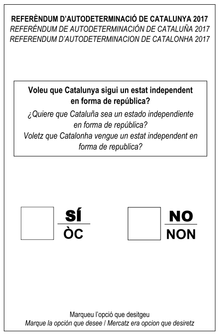https://elpais.com/elpais/inenglish.html
Catalan independence referendum, 2017
The regional Government of Catalonia has set a referendum on Catalan independence for 1 October 2017.[1] The call for referendum was announced in June 2017 and approved on 6 September 2017. The referendum's proponents intend for it to be binding, even though such referendum would be illegal in the Spanish constitutional edifice.[2][3] The referendum was immediately suspended by the Constitutional Court on 7 September 2017, with the Catalan government stating the court order was not valid for Catalonia and proceeding to gather the support of 750[4] of 948 municipalities of Catalonia,[5][6] [7] including Barcelona.[8]
The Government of Spain opposes any Catalan self-determination referendum,[9][10] maintaining that the Spanish Constitution does not allow for a vote on the independence of any Spanish region while also deeming it illegal without its consent;[11][12] an interpretation also favoured by the Catalan Statutory Guarantees Council.[13] On the other hand, the Catalan government invokes the right to self-determination for calling the referendum. However, the Council of Europe, when consulted by Carles Puigdemont, president of Catalan government, said that any referendum must be carried out "in full compliance with the constitution".[14] So far, the Catalan government has tried but failed to get international support; in particular, Spain’s European partners see Catalonia’s status as a strictly internal matter.[14]
Following a constitutionality check demanded by the Spanish government, the Constitutional Court of Spain annulled the resolution emanated by the Parliament of Catalonia to hold such a vote.[15] The Government of Catalonia, though, maintains that the vote will still be held; in this regard, on 9 June 2017, Puigdemont announced it for 1 October.[1] This led to the ongoing 2017 Spanish constitutional crisis.
The Catalan government had aimed to thwart legal action on behalf of the Spanish government by rushing a referendum law through its own parliament, by simple majority, in September[14] declaring that it would then follow a "Catalan-only" legality (as opposed to the general Spanish one). Spain’s deputy prime minister, Soraya Saenz de Santamaria, had notified the Catalan government in advance that the state would strike down the referendum law right after it was passed
Background[edit]
The ballot was initially scheduled for no later than 17 September 2017, a result of an election pledge made by pro-independence parties ahead of the 2015 Catalan election (during the previous legislature, the Catalan government had held a non-binding "citizen participation process" about the question).
The election resulted in a minority government for the Junts pel Sí coalition (JxSí), which had won a plurality of MPs (62 of the 135 seats), plus conditional support from the 10 CUP-CC MPs. Shortly after the government was formed, it resolved to hold a referendum on independence.[16][17][18][19]








Comentários
Postar um comentário